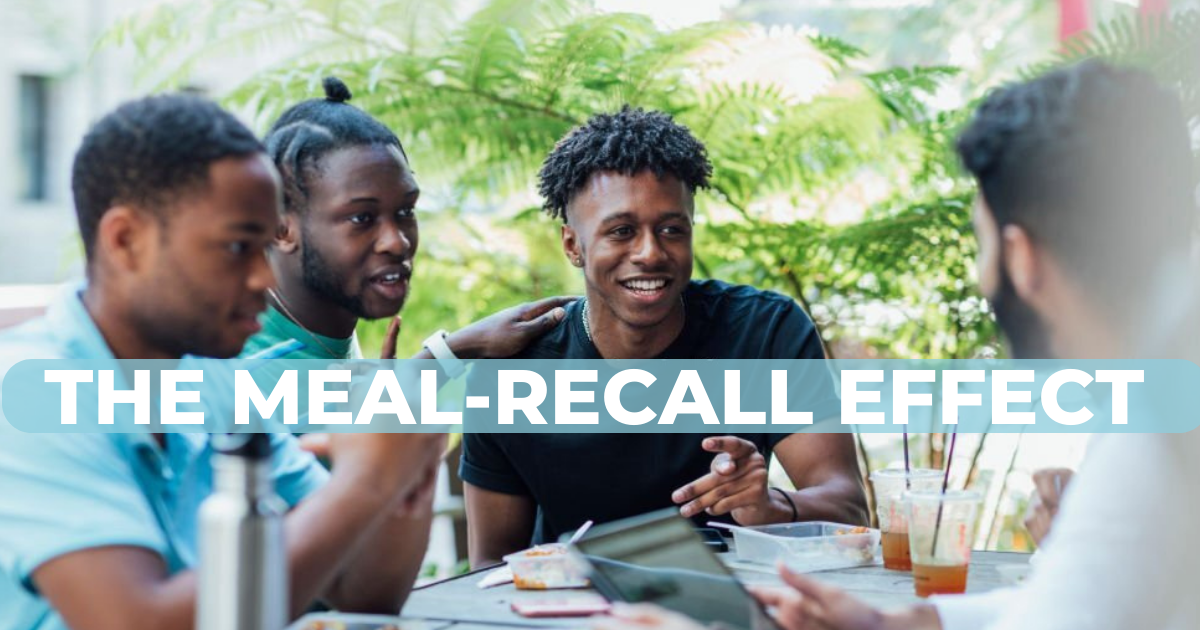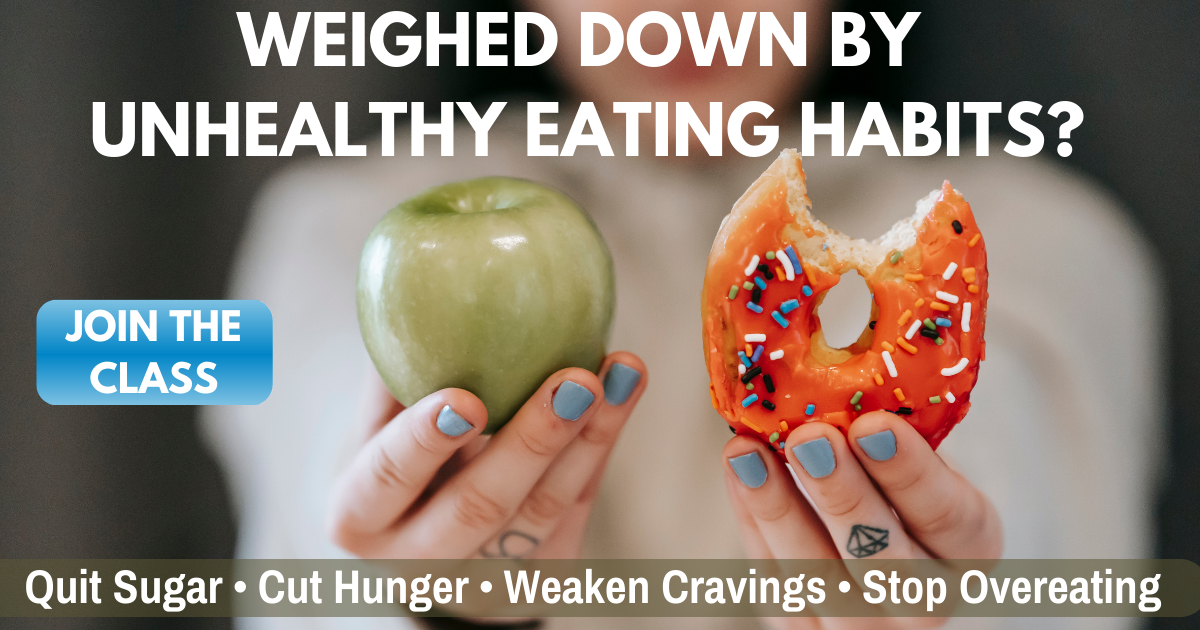
How To Reduce Appetite
EAT LESS WITH THE MEAL-RECALL EFFECT
About 20 years ago a cognitive neuroscience professor discovered something remarkable, something that will teach you how to lower your appetite: Remembering your last meal can cut your hunger in half.
This discovery is a perfect example of the dieting industry’s failure to innovate. Not only did dieting experts not discover the technique you’re about to read, most of them have never even heard of it, even though it’s been around for 20 years.
It Started With Amnesia
About 20 years ago psychologists noticed something odd in their amnesiac patients. They’d finish a meal, forget it, then ask for a second, third or fourth.
The psychologists understood why they’d forget their meal, but why were they not experiencing satiety? Why would they be hungry when their bellies were full? Were their brains ignoring or reversing the sensations of stretched stomach walls and the circulation of satiety hormones like leptin, CCK and PYY?
This led to an intriguing question: Could memory influence hunger and satiety?
How To Reduce Hunger
The question was answered in 2002 with the first study on non-amnesiac patients. It found memory had a huge impact on our appetite and how full we feel. This had profound implications for weight loss: The more you remember your last meal the less you’ll eat at the next one.
This finding rocked the world of brain research, prompting a group of cognitive memory specialists to spend the next two decades replicating the test to see if the hypothesis held. It did and soon, they began referring to memory’s influence on hunger as The Meal-Recall Effect.
Most of the studies on the phenomenon used some form of the following protocol. Half of respondents were asked to describe what they had for lunch and half were not.
Later, both groups were offered a bowl of cookie fragments (whole cookies were avoided to prevent diet-minded respondents from mentally measuring how much they were eating).
The result? People who were asked to remember what they had for lunch ate significantly less cookies than the people who were not asked. The original study showed they ate 14% less cookies. Subsequent studies throughout the next two decades showed decreases ranging from 21% to 51% depending on the food being measured.
If you want to learn how to apply The Meal-Recall Effect for weight loss--how to decrease your appetite-- Neuroslim offers an online course based on the research studies you see in this article.
Why Would Memory Affect Appetite?
Your brain is in constant prediction mode. It needs data to guess how hungry you are, what you should eat (if you should eat) and how much will fill you up.
The data it gets is often confusing, contradictory, and vague. Maybe the brain is having a hard time making sense of the hunger hormones. Maybe a food ad triggered a hunger that wasn’t there before, sowing confusion. Maybe the brain can’t separate the need for fuel from the desire to calm itself with food.
To cut through the clutter of contradictions, the brain places great emphasis on the one thing it feels it can count on: Memory. The brain has always made its most accurate predictions through recollections of the past.
It searches its memory banks and asks, “When I’ve been in situations like this in the past, when I’ve had this kind of food presented to me, when this amount of time has elapsed since I last ate, what did I do and how did it turn out?”
Thus, recalling your last meal helps your brain appropriately interpret the morass of electrical signals it’s receiving. Imagine yourself in one of these Meal Recall studies. If we could put your brain on speakerphone, we’d probably hear something like this:
“Hmmm. How many cookies should I eat? I’m getting confusing signals from my friends at the brain gut axis. Some of the synapses say I’m hungry, but I’m also sensing electric activity that says no, it’s just anxiety. Ghrelin seems listless but the cookies are definitely exciting my visual cortex.
Hey, memory, why haven’t you weighed in? What did we have for lunch? That would be helpful data to plug into my prediction algorithm.
What!? What do you mean you don’t remember! Oh, you were distracted because I let us eat in front of the TV. Bummer.
Hang on, Memory’s being asked a bunch of questions by some researcher. Okay, I’ll wait. Done? Oh, so you do remember eating X amount of food and feeling Y amount of fullness? Ooooh, that’s actually very helpful! Thanks, M!
Alright, let’s put all this data into my Cerebro 5000 Prediction Mainframe, give more weight to Memory’s input to calculate what these eggheads in academia refer to as ‘expected satiety’ and …. Voila! Let me send Hand this signal—“reach for 3 or 4 cookie fragments. No more.”
How To Control Hunger For Weight Loss: Sharpen Your Memory
Adding to the intrigue of memory’s effect on hunger, there is accumulating evidence that excess body weight is associated with poor memory. People with higher BMI perform significantly lower on episodic memory tests. If you want to know how to decrease your appetite, the science is in: Sharpen your memory.
Now, do faulty memories contribute to weight gain or is weight gain causing memory decay? No one knows. The only thing we know for certain is that the sharper your memory is the less you’ll eat.
Memory is a vital cognitive process and is implicated in everything we do. Scientists also discovered it can directly affect our consumption. When you take a moment to think about a recent meal, your brain gets to process that you’ve already been fed and that you don’t need another meal or a snack. It’s called the “meal-recall effect”, and it’s shown to be important in limiting food intake [1].
The Science of Lowering Your Appetite
A study was conducted in 2 experiments in order to demonstrate the effect of meal memory on consumption. In the first experiment, a few hours later after lunch, one group of participants was required to think about what they had for lunch and to write it down, while the other group was required to think freely.
Then they were offered cookies. Participants who thought about their lunch ate less than those who didn’t. This gave researchers a tantalizing clue in how to decrease hunger.
The researchers wanted to make sure these results were due to the meal-recall effect specifically, and not due to thinking about food in general. So the second experiment aimed to differentiate between the two.
This time participants were divided into 3 groups : the first group was required to think about what they had for lunch the same day and to write it down, the second group about their lunch the previous day, and the third group about another topic. The first group had less cookies than the other groups, proving that this effect can only be caused by the recall of a recent meal [2].
Another study conducted by the same scientist and her colleagues aimed to determine in 3 experiments if the meal recall effect depends on the taste of the food, dietary restraint and disinhibition, and the timing of recall, respectively.
In the first experiment, participants were required to think about their lunch under 2 conditions: lunch the same day and lunch the previous day. All the participants were tested in both conditions on different test days.
After thinking about their lunch, they were offered 3 bowls of popcorn that vary in saltiness and were asked to eat and evaluate them. Consistently with the first study, when participants thought about their lunch for that day, their consumption for all 3 popcorn bowls decreased.
Although the popcorn with no salt was consumed the least out of all three, palatability did not influence the meal recall effect on popcorn consumption.
The second experiment was conducted in a similar design to the first, in addition to an assignment of the participants to 4 groups depending on their level of dietary restraint and level of disinhibition.
High disinhibition means an inability to restrain from eating. Participants who thought about their lunch the same day consumed less popcorn than those who thought about their lunch for the day before only when they reported a low score of disinhibition. This means that disinhibition can interfere with meal memory.
In the third experiment, participants were required to either think about what they had for lunch or to think about a topic not related to food, and then to eat cookies.
The experiment was conducted in two days : one of the test days, the time between the recall and the snack was 1 hour, and the other test day it was 3 hours. The researchers found that for participants with low disinhibition, the difference between cookie intake between the lunch group and the journey group was greater in the 3 hour condition than in the 1 hour condition.
These results confirm that the meal-recall effect depends on the time between recall and intake, and is thus related to memory.
Overall, this study confirms the presence of a meal-recall effect, that is dependent on a person’s level of disinhibition and on time, but not on food palatability [3].
Researchers in another study investigated whether the method of recall made a difference in its effect on consumption. Participants were evaluated under different conditions : written recall / verbal recall, and guided recall / unguided recall.
They were then asked to eat and evaluate a snack. Interestingly, the meal-recall was most effective in the unguided and written recall condition. There was no effect in the verbal recall condition, and the guided and written recall condition actually increased consumption.
Therefore, meal recall may be most effective when you write down your thoughts about a recent meal, without guidance from a second person [4].
For stronger evidence, a systematic review was conducted and found six studies that investigate the meal-recall effect. Their results were examined closely and combined in a meta-analysis, that confirmed the presence of a statistically significant inhibitory effect of meal-recall on subsequent food consumption. It also found that distraction can result in an increase in consumption [5].
Taken together, these studies not only provide evidence for the meal-recall effect, they also show the ways in which we can use it to make the most out of it.
This includes things like modifying the mode of recall and focusing during a meal to enhance our memory of it. Being mindful and focused while eating is shown to facilitate the meal-recall effect [6], and being distracted while eating is shown to create the opposite effect [7]. Meal-recall might be one of the simple and effective substitutes to dieting, that are a lot easier to maintain on the long run.
References:
1. Higgs S. (2008). Cognitive influences on food intake: the effects of manipulating memory for recent eating. Physiology & behavior, 94(5), 734–739. https://doi.org/10.1016/j.physbeh.2008.04.012
Quote: Evidence suggests that manipulation of cognitions at the time of eating have profound effects on food intake and that conditioning processes, which rely on memory, are likely to contribute to these effects. There is also evidence that manipulating memory for the most recent meal affects subsequent food intake, suggesting that information about recent eating in memory is factored into momentary decisions about food consumption.
2. Higgs, S. (2002). Memory for recent eating and its influence on subsequent food intake. Appetite, 39(2), 159-166. https://doi.org/10.1006/appe.2002.0500
Quote: These results are consistent with the suggestion that memory of recent eating is an important cognitive factor influencing food intake.
3. Higgs, S., Williamson, A. C., & Attwood, A. S. (2008). Recall of recent lunch and its effect on subsequent snack intake. Physiology & behavior, 94(3), 454–462. https://doi.org/10.1016/j.physbeh.2008.02.011
Quote: It is concluded that the inhibitory effect of recalling foods eaten at lunch on subsequent snack intake is a robust phenomenon that is related to memory of that lunch and is moderated by tendency toward dietary disinhibition.
4. Szypula, J., Ahern, A., & Cheke, L. (2020). The role of memory ability, depth and mode of recall in the impact of memory on later consumption. Appetite, 149, 104628.
https://doi.org/10.1016/j.appet.2020.104628
5. Robinson, E., Aveyard, P., Daley, A., Jolly, K., Lewis, A., Lycett, D., & Higgs, S. (2013). Eating attentively: a systematic review and meta-analysis of the effect of food intake memory and awareness on eating. The American journal of clinical nutrition, 97(4), 728–742.
https://doi.org/10.3945/ajcn.112.045245
6. Higgs, S., & Donohoe, J. E. (2011). Focusing on food during lunch enhances lunch memory and decreases later snack intake. Appetite, 57(1), 202–206.
https://doi.org/10.1016/j.appet.2011.04.016
7. Higgs, S., & Woodward, M. (2009). Television watching during lunch increases afternoon snack intake of young women. Appetite, 52(1), 39–43. https://doi.org/10.1016/j.appet.2008.07.007
Althubeati, S., Avery, A., Tench, C. R., Lobo, D. N., Salter, A., & Eldeghaidy, S. (2022). Mapping brain activity of gut-brain signaling to appetite and satiety in healthy adults: A systematic review and functional neuroimaging meta-analysis. Neuroscience and biobehavioral reviews, 136, 104603. https://doi.org/10.1016/j.neubiorev.2022.104603
Quote:
The results from the systematic review revealed the modulation of insula, amygdala, hippocampus, and orbitofrontal cortex (OFC) with appetite regulators, where satiety regulators were more associated with caudate nucleus, hypothalamus, thalamus, putamen, anterior cingulate cortex in addition to the insula and OFC. The two neuroimaging meta-analyses methods identified the caudate nucleus as a key area associated with satiety regulators.
Zanchi, D., Depoorter, A., Egloff, L., Haller, S., Mählmann, L., Lang, U. E., Drewe, J., Beglinger, C., Schmidt, A., & Borgwardt, S. (2017). The impact of gut hormones on the neural circuit of appetite and satiety: A systematic review. Neuroscience and biobehavioral reviews, 80, 457–475. https://doi.org/10.1016/j.neubiorev.2017.06.013
Quote: Our systematic review suggests that the plasma level of ghrelin, the gut hormone promoting appetite, is positively correlated with activation in the pre-frontal cortex (PFC), amygdala and insula and negatively correlated with activation in subcortical areas such as the hypothalamus. In contrast, the plasma levels of glucose, insulin, leptin, PYY, GLP-1 affect the same brain regions conversely.
Ahima, R. S., & Antwi, D. A. (2008). Brain regulation of appetite and satiety. Endocrinology and metabolism clinics of North America, 37(4), 811–823. https://doi.org/10.1016/j.ecl.2008.08.005
Quote: Neurons involved in the homeostatic regulation of feeding are located mainly in the hypothalamus and brainstem. In addition, neuronal circuits in the limbic system mediate the motivational and reward aspects of feeding.
Abizaid, A., Liu, Z. W., Andrews, Z. B., Shanabrough, M., Borok, E., Elsworth, J. D., Roth, R. H., Sleeman, M. W., Picciotto, M. R., Tschöp, M. H., Gao, X. B., & Horvath, T. L. (2006). Ghrelin modulates the activity and synaptic input organization of midbrain dopamine neurons while promoting appetite. The Journal of clinical investigation, 116(12), 3229–3239. https://doi.org/10.1172/JCI29867
Quote: Taken together, these data suggest that the mesolimbic reward circuitry is targeted by peripheral ghrelin to influence physiological mechanisms related to feeding.
Iovino, M., Messana, T., Lisco, G., Mariano, F., Giagulli, V. A., Guastamacchia, E., De Pergola, G., & Triggiani, V. (2022). Neuroendocrine modulation of food intake and eating behavior. Endocrine, metabolic & immune disorders drug targets, 10.2174/1871530322666220127114326. Advance online publication. https://doi.org/10.2174/1871530322666220127114326
Quote: Orexigenic and anorexigenic hormones secreted from the gastrointestinal tract and adipose tissue regulate brain areas involved in eating behavior via gastric afferent vagal nerve, circumventricular organ area postrema, or transporter system.


